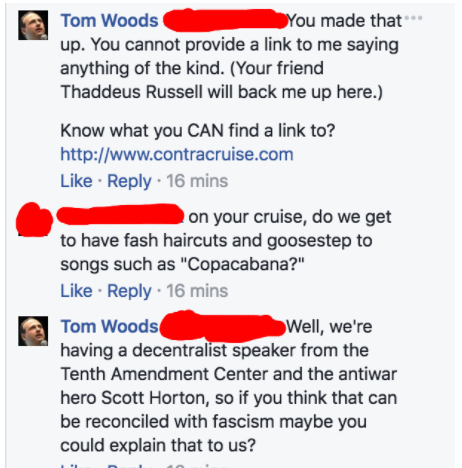A Tale of Two Conspiracies
In the last month I have become intimately acquainted with two conspiracies afoot in the libertarian economics community:
-
CONSPIRACY #1
James Buchanan was a founder of Public Choice economics. Its scholars are actively seeking to end injustice perpetrated by the State, and to advance individual liberty. Buchanan invited an outspoken opponent of apartheid to his school, during the height of the U.S. debate over desegregation.
Nonetheless, according to some critics, because segregationists were able to use some of Buchanan’s policy positions (like getting the government out of schooling altogether), Buchanan has a cloud of suspicion over him. Indeed, he used some political principles and phrases in his work that were also used by John Calhoun and Donald Davidson. (It doesn’t matter if Buchanan’s defenders can point out non-bad-guy precedents for that language.) Also, one of Buchanan’s fans said that “the weakening of the checks and balances” in the U.S. political system “would increase the chance of a very good outcome.” Yikes! Now it’s true, Buchanan’s fans come back and try to explain the context of that quote, but give us a break–what kind of person writes like that?
So even though any one of the specific arguments used against Buchanan and his followers might be a non sequitur, it doesn’t really matter. The critics have known these Public Choice types for decades; these people are just a bad crew. They obviously don’t care about poor minorities; if they did, then obvious racists wouldn’t flock to them and hide behind their “free market” rhetoric. Some of the critics might be more nuanced and admit that maybe Buchanan himself isn’t a huge racist or segregationist, but c’mon, he should’ve known better than to be used by such types and advance their racist agenda.
-
CONSPIRACY #2
Ludwig von Mises was a Jewish economist who had to flee Nazi persecution. (Don’t take my word for it: Ask Batman.) The Ludwig von Mises Institute was founded in 1982, with its intellectual leader being Murray Rothbard, another Jewish economist.
Last week, the Mises Institute held its annual “Mises University” conference, in which more than 100 students come to learn about Austrian economics and applications of libertarian political theory.
The week was kicked off by a lecture from Tom Woods. As is his wont, Tom took the opportunity to promote the 1000th episode of his podcast, which is going to be hosted by a black guy. (And not a Clarence Thomas, respectable-to-National-Review kind of guy, but someone who writes on Facebook [I’m paraphrasing but very close]: “I can’t stand grown ass men who act like whiny little b*tches!” kind of guy.) For what it’s worth, Tom himself is a Catholic, and not in a hey-is-Joe-Biden-Catholic kind of way, but in a “Let me tell you why Vatican II was an abomination” kind of way.
During the week, two of the prominent lecturers are David Gordon and Walter Block, both Jewish. By far the lecturer afforded the most respect is Judge Andrew Napolitano, whose public talk and then restricted academic lectures are about the alarming loss of personal and economic liberties with the eroding of the U.S. Constitution, and how the students need to wake up to protect their ability to speak out against the government.
The week also featured Matt McCaffrey speaking on the Economics of War, in which he was *against* the practice. He closes with a quotation (around 42:40) from Mises about how peace is the father of all things, as a direct rebuke to the nationalist militarists of his day. McCaffrey explicitly says that Mises rejects militarism, autarky, and nationalism, and promotes peace and commercialism.
For my own humble part, I learned the most I’ve ever heard about Islam from a very traditional Muslim woman–who was a Summer Fellow at the Institute and was dressed in a way that would make her faith quite clear to anybody. During one of my talks–in which I explained ways that we could avoid the warfare of the State and how to minimize police brutality–I literally made fun of Nazis. (My talk from this year isn’t up yet, but you can see the slide from last year’s talk at 39:13 where I have an X crossing out a Nazi event.)
Notwithstanding the above, on the last day the president of the Mises Institute, Jeff Deist, concluded a speech on how to market libertarian ideals to the average person in this way:
I’m sure all of us would fight for our physical persons if we were attacked, or for our families if they were attacked. We might fight for close friends too. And perhaps even our neighbors. In fact we might like to think we would physically defend a total stranger in some circumstances, for example an old woman being attacked and robbed.
And we probably would fight for our towns and communities if they were physically invaded by an outside force, even though we don’t personally know all of the people in our towns and communities.
We might fight for property too, maybe not as fiercely. We certainly would protect our homes, but that’s because of the people inside. How about cars? Would you physically tangle with an armed robber who was driving away in your car? Or would you let him go, and not risk death or injury, just to save your car? How about your wallet? How about someone stealing 40% of your income, as many governments do? Would you take up arms to prevent this?
We probably wouldn’t fight for bitcoin, or net neutrality, or a capital gains tax hike, by the way.
How about an abstraction, like fighting for “your country” or freedom or your religion? This is where thing get more tenuous. Many people have and will fight for such abstractions. But if you ask soldiers they’ll tell you that in the heat of battle they’re really fighting for their mates, to protect the men in their units–and to fulfill a personal sense of duty.
In other words, blood and soil and God and nation still matter to people. Libertarians ignore this at the risk of irrelevance.
Thank you very much.
Now that part I put in bold: Because this was a Nazi slogan (which they actually took from Oswald Spengler, a German conservative who would end up condemning Hitler and the Nazis), some critics concluded that the Mises Institute was actually secretly doing what it could to advance neo-Nazis. To be sure, Deist’s defenders responded that he wasn’t invoking the Nazis, but instead was reacting to a Jeff Tucker article from a few weeks earlier that had “blood and soil” in its title. (To be clear, Tucker wasn’t attacking Deist or the Institute in this article.)
Didn’t matter. The critics after all would never have written such a phrase, so the issue was settled. And in any event, even if this particular quotation has an alibi, that doesn’t erase the fact that these critics have followed the Auburn people for decades and just know how awful they are. Oh sure, they might officially say they oppose war and want to break up the strong centralized State so diverse people can pursue their own idiosyncratic lifestyles, but they have to say that. Really, if we read their minds, we know that what they are really doing is giving a nod and a wink to neo-Nazis. Is it any surprise that bigots flock to this “Rothbardian libertarian” rhetoric? It favors their agenda, and the people in Auburn should know better than to aid and abet these people.
Also, to be fair, some of the Institute’s critics are more nuanced. They aren’t saying we ourselves are actual racists just that:
(That guy is the current chair of the Libertarian Party, which is why I didn’t block out his name.)
-
WHAT DID WE LEARN?
I could understand how Nancy MacLean and her fans could believe in both of the above conspiracies. It’s perfectly consistent to do so: Why wouldn’t a bunch of segregation-loving racists also like Hitler? It all fits.
I could also understand how some people would reject both of the above conspiracies as utterly baseless and palpably absurd. For example, Tom Woods, Tom DiLorenzo, and David Gordon have in the past crossed swords with some DC-based libertarians, and yet they all went on record saying how crazy MacLean’s accusations are.
But what really strikes me as ironic is that some people reject Conspiracy #1 as monstrous, going so far as to question MacLean’s standing as a scholar and demanding that her peers throw her under the bus, while at the same time the same people endorse Conspiracy #2, or at least keep their mouths shut about the whole thing because it’s just so awkward.
I’m not asking such people to speak out against the critics of the Mises Institute; I realize how awkward that really is, especially if jobs are at stake. But I’m asking you to relax now that you understand the motivations of MacLean and her fans. You really can’t be that upset at them anymore; their behavior should be perfectly comprehensible after the last week of Facebook drama.
-
LOOSE ENDS
1) I’m closing the comments on this post. I don’t want to add even more fuel to the fire.
2) If you think we are overreacting to this, here are two examples of the kind of crap we have now had to endure:
First, on Facebook Tom had to clarify to people that we are not having fascist events on our Cruise:
Second, here’s a text I got last night from a woman whom I had invited to the event (her first time at the Mises Institute):
Third, since I’ve seen some of the critics of Deist’s speech wondering aloud what he could possibly have in mind when contrasting his approach with the more “libertine” one favored by other libertarian groups, here’s something I saw on Twitter yesterday. Normally I wouldn’t have brought it up, but like I said, I see people guffawing like Jeff is complaining about Elvis shaking his hips:










